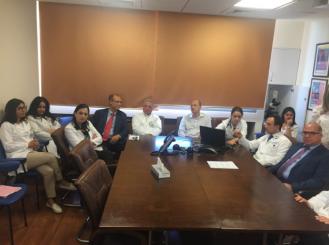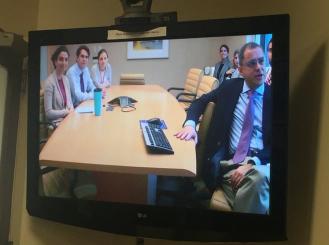In the current state of fast-track advances in research and knowledge, treatment of patients with cancer is best done by multidisciplinary teams. Multidisciplinary team models can be either multidisciplinary units or multidisciplinary tumor boards. Multidisciplinary units are resource-intensive and require the availability and presence of various specialists, large supportive nursing and administrative staff, ample time, and physical infrastructure that allows examination of patients by multiple physicians, expedited performance of diagnostic procedures, and scheduling of surgical and therapeutic plans. For example, after recently giving talks on global BRCA mutations and International Consensus Guidelines on Advanced Breast Cancer (ABC3) at the Fred Hutchinson Cancer Center of the University of Washington in Seattle, WA, I had the privilege of attending their multidisciplinary tumor boards, followed by a breast unit patient encounter, where they saw the few cases that were discussed in their tumor boards. Physicians spent a whole afternoon seeing and discussing only five patients. Of course, this is a luxury that countryside hospitals and resource-limited countries cannot afford.
On the other hands, multidisciplinary tumor boards are meetings where various specialists present cases and make collective decisions about recommendations for patient management. Tumor boards require much fewer resources than cancer units. A tumor board coordinator would help scheduling and preparing summaries of new cases, physicians present the cases, review imaging and pathology, and make decisions regarding the best course to follow for management. In areas where all specialists are not available, such as distant countryside places or low- and middle-income countries (LMIC), mini tumor boards can be held with whatever specialists are available.
Tumor boards have become widely practiced worldwide, according to an ASCO International survey published in the Journal of Global Oncology. However, in many circumstances, patients are still treated by individual physicians and surgeons in distant countryside hospitals and LMIC. Advances in information technology have made teleconferencing and videoconferencing easily applicable and available for very low costs. Videoconferencing can be used for tumor board discussions as well as case-based teaching. At the American University of Beirut Medical Center (AUBMC), in addition to our weekly on-site tumor boards, we have been practicing videoconferencing with Memorial Sloan Kettering Cancer Center (MSKCC), New York, NY, and with MD Anderson Cancer Center (MDACC), Houston, TX, for over 5 years. The monthly Beirut-New York AUBMC-MSKCC and Beirut-Houston AUBMC-MDACC videolinks are organized with the leaderships of Dr. Ghassan Abou-Alfa of MSKCC and Dr. Hagop Kantarjian of MDACC. Those meeting have been very well appreciated and enjoyed by all faculty and oncology fellows on both sides of the Atlantic Ocean and Mediterranean Sea. We have even expanded the online tumor boards to include various subspecialties, including hematologic, breast, gastrointestinal, and urologic oncology.
Our experience shows that multidisciplinary videoconferencing can be easily practiced in a conference room equipped with a computer, screen projection, or TV screen. There is no excuse for not trying to partner with an institution that has all experts and specialties available. It is good for both patients and for oncology staff.




Recent posts